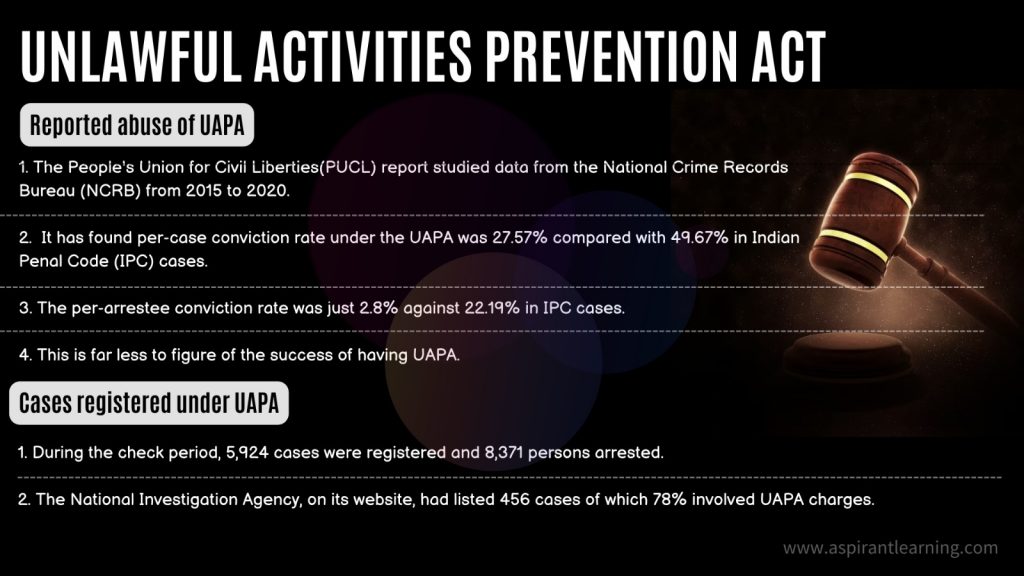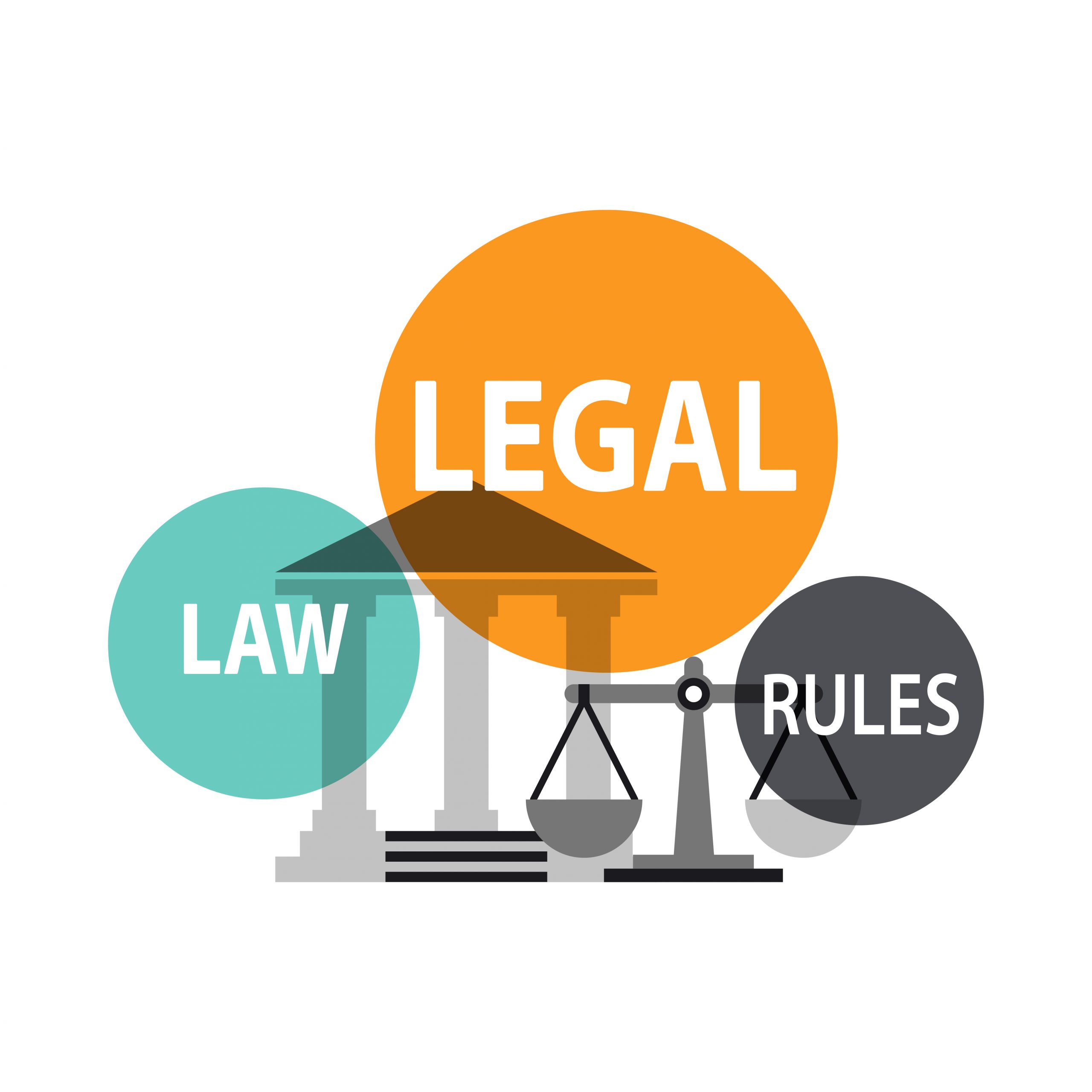News Highlights:
- Recently, the Supreme Court clarified that a person who “is or continues to be” even a “mere member” of a banned organisation is criminally liable under Unlawful Activities Prevention Act (UAPA) for acting against the sovereignty and integrity of India.
- The Supreme Court has set aside a series of its own judgments, which had concluded that “mere membership” – unlike “active membership” – of an unlawful association or organisation did not make a person a criminal or a terrorist.
Unlawful (Activities) Prevention Act (UAPA)
- About
- The UAPA is aimed at effectively preventing unlawful activity associations in India.
- Its main objective was to make powers available for dealing with activities directed against the integrity and sovereignty of India
- It is an upgrade on the Terrorist and Disruptive Activities (Prevention) Act TADA, which was allowed to lapse in 1995 and the Prevention of Terrorism Act (POTA) was repealed in 2004.
- It was originally passed in 1967 under the then Congress government led by former Prime Minister Indira Gandhi.
- Till 2004, “unlawful” activities referred to actions related to secession and cession of territory. Following the 2004 amendment, the “terrorist act” was added to the list of offences.
What are Unlawful Activities and Associations?
- Overview:
- The UAPA lays down the definitions and rules for designating an organisation as an “unlawful association” if it engages in certain activities.
- Under Section 3 of the UAPA Act, the government can declare an association “unlawful”.
- The government can then issue a notification designating such an organisation as a terrorist organisation if it believes that the organisation is part of “terrorist activities.”
- Unlawful Activities:
- Under section 2(o) of the UAPA, an unlawful activity about an individual or association means – Any action taken by such an individual or association (whether by committing an act or by words, either spoken or written or by signs or by visible representation or otherwise), –
- Works for the Cession of a part of the territory of India or the secession of a part of the territory of India from the Union
- Disclaims, questions, disrupts or is intended to Disrupt the sovereignty and territorial integrity of India; or
- which causes or is intended to cause Disaffection against India;
- Related and ancillary acts, including financing, support or promotion of any such activities are also “unlawful activity”.
- Under section 2(o) of the UAPA, an unlawful activity about an individual or association means – Any action taken by such an individual or association (whether by committing an act or by words, either spoken or written or by signs or by visible representation or otherwise), –
- Unlawful Association:
- The UAPA also defines an “Unlawful Association” under section 2(p) as meaning any association–
- which has for its object any unlawful activity, or which encourages or aids persons to undertake any unlawful activity, or of which the members undertake a such activity or
- which encourages or aids persons to undertake any such activity, or of which the members undertake any such activity.
- The UAPA also defines an “Unlawful Association” under section 2(p) as meaning any association–
Issues with UAPA
- Criminalising Thoughts:
- It criminalises mere thoughts and political protests that cause “disaffection” with the state.
- It is an assault on citizens’ right to expression, which is also a collective right of groups and unions to disseminate their views.
- Ignoring Fundamental Rights:
- It can simply bypass fundamental rights and procedures.
- For instance, those arrested under UAPA can be incarcerated up to 180 days without a charge sheet being filed. It thus directly violates Article 21 of the constitution.
- Highly Discretionary:
- It confers upon the government broad discretionary powers and also authorises the creation of special courts with the ability to use secret witnesses and to hold closed-door hearings.
- Hindering dissent:
- It is being used to suppress dissent through intimidation and harassment, thus threatening the very existence of public debate and freedom of the press and criminalising the performance of civil liberties.
- Parliamentary Powers:
- The issue remains whether the Parliament can classify the individual as a terrorist only because it believes him to be involved in terrorism without any trial whatsoever.
- Restricts Freedoms:
- UAPA empowers the parliament to restrict the rights and freedoms of citizens to protect ‘the sovereignty and integrity of India’.
- Stringent Provision of bail:
- The standard for bail under the UAPA is that it cannot be granted unless the court believes that the accused is innocent of the alleged offence.
- This is a prima facie standard, which means that the onus of proof of innocence, even to obtain bail, is effectively reversed.
- For the purposes of bail, it is for the accused to show that he is innocent.
- Sharp Rise in Use:
- This caution is significant given the sharp surge in the state’s use of this provision in a wide range of alleged offences – against tribals in Chhattisgarh, those using social media through proxy servers Jammu and Kashmir, and journalists in Manipur among others.

Conclusion:
- This judgment is a significant step towards preventing unlawful activities and protecting the sovereignty and integrity of India.
- While the ruling has been praised by the government, civil rights advocates have raised concerns about the implications of this judgment on fundamental rights.
- It remains to be seen how this ruling will be applied and enforced in practice.
Pic Courtesy: Freepik
Content Source: The Hindu



